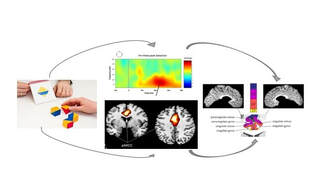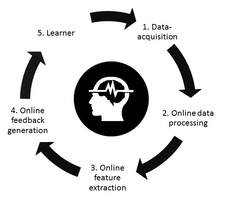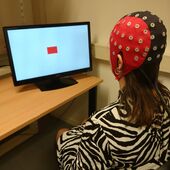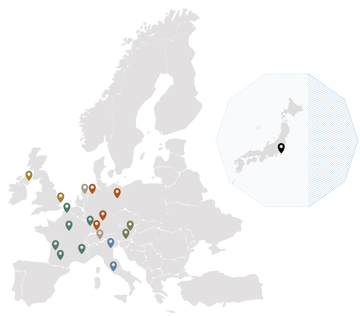Research themes
I. Neuroscientific research on executive functions II. Cognitive enhancement of executive functions

The human being has impressive cognitive abilities. To define and to update objectives, to adapt flexibly to the environment, and to guide appropriate behavior are just a few examples. These abilities rest upon executive functions (EFs). We assess how the brain implements these functions. Our research interests concern the neural correlates of EFs and the neural underpinnings of inter-individual differences in healthy young adults as well as in older participants and people with mental disorders. For the understanding of normal behaviour, healthy cognitive aging and psychopathologies, such differentiation of functional and neuroanatomical markers and the establishment of associations between the brains` morphology, neurofunction and behavior are crucially important.
|

In context of cognitive enhancement, neuroscientific techniques like neurofeedback demonstrate great potential by offering a rather direct pathway to the underpinnings of cognition via the modulation of relevant neural mechanisms. A specific type of neural mechanism are neural oscillations, which seem to directly reflect perceptual and cognitive processes. A particular oscillation reliably associated with EFs is the so-called frontal-midline (fm)-theta, which is suggested as “working language” of EF. Our investigation includes testing the effects of fm-theta self-regulation, the investigation of the working languages and optimization of the protocol. For the application of neurofeedback, a freely available software program was developed: NeurofeedbackSuite 1.0 (NFS).
|
III. Translational research
Executive functions (EFs) play a pivotal role in achieving success in our daily lives. Disturbances of EFs are furthermore associated with neurocognitive and psychiatric disorders often contributing to a decline in overall functional outcomes. Given the fundamental role of EFs in our day-to-day existence and their relation to disorders, research on effective EF-training is vitally important. Within this context, our research focuses on developing different types of training approaches as peak-performance and therapeutic tools.
|
Ongoing lab projects
|
NEUROFEEDBACK AS A POTENTIAL THERAPEUTIC TOOL

Here, we study the potential of NF training in a subclinical group with individuals indicating subjective impairments of executive functions.
Semi naturalistic lab study: Psychedelic-assisted interventions
In this feasibility study we tested the first experiment on the combination of microdosing with truffels before self-regulating brain activity and will soon present.
|
|
International initiatives |
|
|
Consortium: The Big Shared MI-Brain Computer Interface Protocol

Mental-imagery Brain Computer Interfaces are of great interest for many different fields, ranging from assistive technologies to video games, through cognitive and motor rehabilitation (e.g., stroke patients) and enhancement (e.g., athletes).
While promising, MI-BCIs remain barely used outside laboratories due to their modest reliability. This project is a collaborative, international and interdisciplinary project, with more than 25 labs, which will build up a shared MI-BCI dataset based on a rigorous and standardized experimental protocol. In Groningen, we currently assess how to best teach participants to perform mental imagery task. For more information of our research, please follow the link. International working group: frontal-midline theta Neurofeedback
Frontal theta neurofeedback has been applied in different laboratories and by different researchers around the world. In collaboration with an international research group, we are investigating aspects of fm-theta neurofeedback data to better understand learning mechanisms. Our goal is to increase the effectiveness of neurofeedback protocols for everyday cognitive activities.
|

